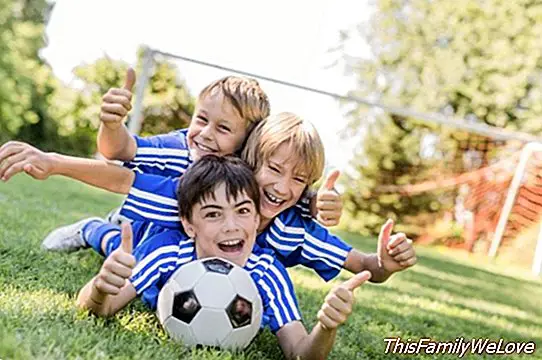In football, fair play: friendship and companionship

Soccer is a team sport that raises passions and has millions of followers around the world. Aware of the popularity of this sport, FIFA created a program with the name of Fair Play (fair play) whose objective is to encourage sportsmanship and prevent discrimination in football. Further, Fair Play it also includes programs to reduce racism in stadiums.
The program is not only limited to football but also supports charitable organizations that improve conditions around the world.
The principles of the program Fair Play or fair play
These are the 10 principles on which the program is based Fair Play on the sport:
1. Play in a clean way. 2. Play to win but accept defeat with dignity. 3. Comply with the Rules of the Game. 4. Respect the opponent, teammates, referees, line judges and spectators. 5. Promote interest in football. 6. Reward those who defend the good reputation of football. 7. Reject corruption, drugs, racism, violence, gambling and other dangers of this sport. 8. Help others resist corruption pressures. 9 Report to those who try to discredit football. 10. Use football to make a better world.
How to encourage children to practice fair play
To exemplify, among team sports there is nothing better than football. For something is the king sport in Europe and Latin America. Emphasizing the value of friendship and special fellowship among team members is the basis for educating children in the practice of fair play.
1. Encourage the classmates. For a player, there is nothing worse than your partner throwing errors in your face. On the contrary, we will have to encourage each other, even if we lose by many to zero.
2. Go out to play, not to stand out. Each player has a well-defined position, zone and mission. A football team is like a precise machine and it works when everyone obeys the coach. There is, therefore, the desire to emphasize one over the others. Soccer teaches many virtues and, one of them is that the team fight is more effective than the individual.
3. Do not stop running a ball. When everyone is struggling to play at the highest level, stop running a ball or stop chasing an opponent is one of the most serious faults: it's like saying to the teammates: "fight you, I'm tired." If we start from the fact that we are all partners and that we seek the same goal, we will have to sacrifice ourselves for everyone and run. And if we can not, ask for the change ourselves.
4. Kicks that are not seen. In any sport an exquisite compliance of the rules is basic because, if not, it is counterproductive for anyone. So, even if they do not see us, we can not kick, touch the ball with their hands, pretend they have given us, throw themselves for a penalty ... It would be a theater school instead of a sport.
5. Involuntary kicks. In any case, sometimes our feet or hands get lost and we knock down the opponent. This is soccer. But as it is about scoring goals, not eliminating opposing players, we must be interested in him, ask for forgiveness, help ... If we mark an aggressive player you have to see the referee (or the captain). We can also talk to him, even if it seems utopian. If it does not work, we will show more strength, but never revenge or go to harm.
6. Do not discuss the referee. The first reaction is nothing, but you have to get used to the fact that the referee's mission is to judge even if he makes a mistake. There is nothing worse than a match in which everyone shouts at the referee what they think is fair.
7. Win and lose. In the end we will win, lose or draw. Showing joy if you win is easy, but knowing how to lose without sinking is difficult. First of all, we must avoid thinking that the fault lies with others. It is everyone's fault and between them all can be amended. We must recognize the effort of our colleagues, without criticizing the worst. If in the locker room there are criticisms between one and the other, it could almost be said that there is no team there: it would be better to leave it and dedicate itself to something else.
Ignacio Iturbe




